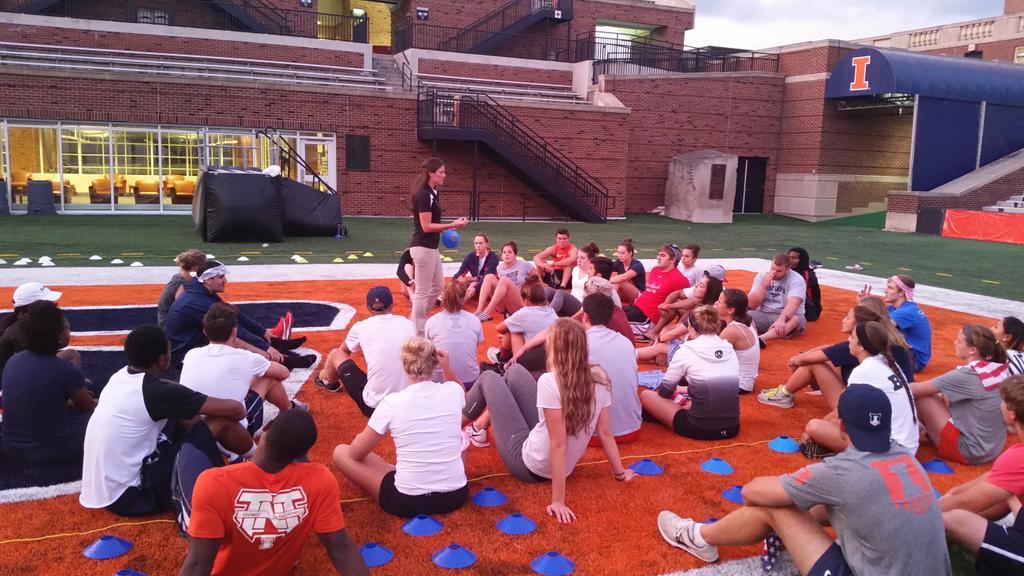


Are You a 2R Coach?
Leadership is obviously a highly challenging skill and very few people become true masters at the art and science of leading others.
While effective leadership is based on a myriad of attributes and abilities, we can boil down its essence into two primary skills.
The best coaches, athletic directors, managers, leaders, and captains know both how and when to do two essential things well:
1. RELATE
How well do you relate with your people?
Effective leaders develop solid relationships with their athletes based on a sense of mutual trust and respect. As one critical variable of effective leadership, you have to earn and maintain the trust of your athletes to be an effective leader.
2. REQUIRE
How well do you require your people to produce results?
Effective leaders also must have the ability to demand the best from their athletes. You must be willing to challenge and push your athletes so they reach their full potential. You must hold them accountable.
Ideally, successful leaders have the ability to both Relate and Require effectively and appropriately. However, very few (less than 10%) have learned to master both skills. Each leader has a natural style that he/she tends to use and sometimes overuse - often at the expense of effectively using the other style.
Thus, some leaders' natural style is to be more of a Relater but they might have trouble requiring. Others tend to be more comfortable as a Requirer but have difficulty relating well with their people.
As you reflect on your coaching, which style do you tend to use most often?
Are you more of a Relater or a Requirer?
How would your athletes rate you?
 Relying too much on one particular style causes problems - for you and your athletes. Excessive Relaters can become overly concerned with being liked and avoid confronting their athletes for poor performance. Conversely, excessive Requirers can be too overbearing and show little concern for people issues.
Relying too much on one particular style causes problems - for you and your athletes. Excessive Relaters can become overly concerned with being liked and avoid confronting their athletes for poor performance. Conversely, excessive Requirers can be too overbearing and show little concern for people issues.
Thus, the ideal leader, or 2R Manager as Peter Friedes calls it in his 2R Manager book, has the ability to Relate and Require at the appropriate levels - not too much or too little, but just right.
Legendary coaches like Mike Krzyzewski, Pat Summitt, Mike Candrea, Roy Williams, and Karen Shelton had excellent people skills and related extremely well with their athletes - yet they could be very demanding as they pushed their athletes to reach their full potential.
PROS AND CONS OF RELATERS AND REQUIRERS
Let's take a look at some of the pros and cons of both the Relating and Requiring styles.
RELATERS
 Pros: caring, empathic, sensitive, understanding, good listener, open to input, good communicator, confidence-builder.
Pros: caring, empathic, sensitive, understanding, good listener, open to input, good communicator, confidence-builder.
Cons if taken too an extreme: insecure, need to be liked, soft, pushover, avoid conflict. In actuality, Excessive Relating only furthers the needs of the coach, not the needs of the athletes.
Athletes who play for Excessive Relaters might say things like:
"He's trying too much to be my friend - not my coach."
"She doesn't give me enough feedback on how I can improve."
"It's clear that he is very uncomfortable with conflict."
"I don't respect her because she doesn't hold me or my teammates accountable."
When athletes feel this way, they get very frustrated because you are not giving them the discipline and feedback they need to be effective. They expect you to hold them and their teammates accountable to higher standards. If you don't, they are likely to pack it in and let things slide.
REQUIRERS
 Pros: focused on getting things done, clear goals, delivers results, high energy, driven, sense of urgency, demanding.
Pros: focused on getting things done, clear goals, delivers results, high energy, driven, sense of urgency, demanding.
Cons if taken to an extreme: insensitive, inflexible, controlling, quick to criticize and slow to praise, micro-managing, aloof, close-minded, obsessed. Excessive Requiring leads to athletes who can feel incompetent and used.
Athletes who play for Excessive Requirers might say things like:
"I feel like I can never do anything right around him - nothing is ever good enough."
"She doesn't seem to care about me - only the game and winning."
"He always thinks he is right - about everything."
"She is very critical - she never gives us any compliments."
When athletes feel this way, you seldom get their best effort. You can force them to comply with your demands but you will never really gain their commitment. They will do just enough to get by and avoid your criticism, but you will not get any of their discretionary/extra effort. If you are not monitoring them, they will have a tendency to slack off. They will look to merely survive the situation - or many of them will look to leave, especially in today's transfer portal world in college athletics.
Honestly evaluate which of the 2R's is more natural and comfortable for you - and which one is more of a challenge. Do the same for your coaching staff and your team leaders. Look to help each leader recognize their strengths and areas to improve when it comes to their 2Rs.
 For more information, check out Peter Friedes' excellent book The 2R Manager as well as our Team Captain's Leadership Manual for your team leaders.
For more information, check out Peter Friedes' excellent book The 2R Manager as well as our Team Captain's Leadership Manual for your team leaders.
